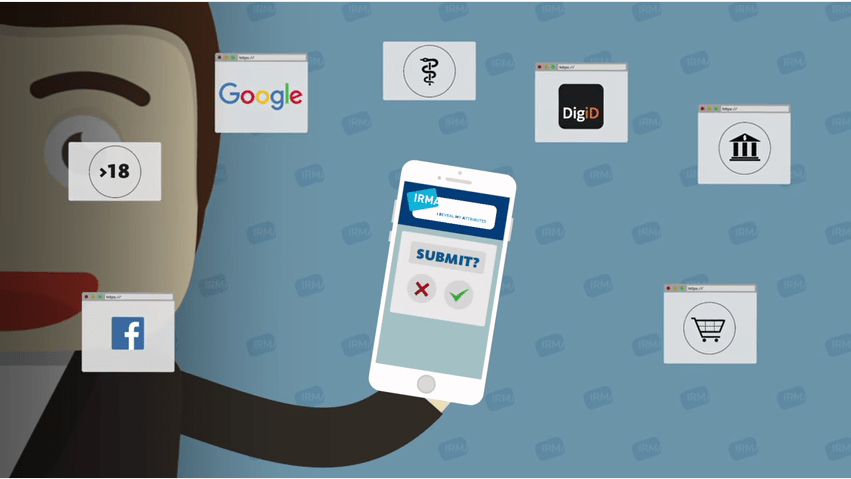NGI-supported project makes private messaging accessible

End-to-end encryption is slowly becoming popularized in online messaging, but major channels like email are left largely unencoded despite publicly available solutions. “Cryptographic key management is still too difficult for mainstream use” says computer security Professor and Head of the Privacy by Design Foundation, Bart Jacobs. The Foundation will make cryptography more accessible for the Next Generation Internet by extending its identity platform I Reveal My Attributes (IRMA) with identity-based encryption for email. “Right now this is the most promising user-friendly approach.” says Jacobs. Read more in our NGI Interview.
NGI: Let’s recap the main issues with encryption today and how email got left behind.
Encryption has gained online traction over the last few years, with Google and Mozilla deprecating HTTP; Cloudflare supporting a new IETF protocol for DNS-over-HTTPS; and WhatsApp offering end-to-end encryption. But the most widely-used communication channel, email, is still rarely protected and concealed. Proven solutions like PGP and OpenPGP are publicly available, but for many users they are technically too difficult to setup and maintain. All people can do is blindly trust their email providers to protect their privacy and the volumes of (sensitive) data they send and share online.
To make encoded email simpler, cryptography needs to be understandable, easy to manage and in practice be nothing more than a click or a few swipes away. Managing cryptographic keys (used to encrypt and decrypt data) is challenging. The Next Generation Internet supports a unique project of the Privacy by Design Foundation that will develop easy-to-use encryption as a plugin for the email client Thunderbird. The project will center public key cryptography around users’ identities and the attribute-based identity platform IRMA. Public key cryptography uses public and private keys to encode and decode messages. Users usually need to generate these keys and connect the public key to their identity themselves, which can be a complex process. Instead, this project lets users create a public key based on a unique attribute like a phone number or email address. To demonstrate that you actually possess that attribute, you use the existing attribute-based platform IRMA. The Thunderbird encryption plugin will be developed as a proof-of-concept.
This project receives funding and support from the Next Generation Internet initiative and was selected by the NGI Zero open call for privacy and trust enhancing technologies.

NGI: How does identity-based encryption make cryptography more accessible and usable?
Bart Jacobs: Right now, identity-based encryption is the most promising approach to handle public key cryptography in a user-friendly way. The main reason for this is that the actual cryptographic key management for the most part can be handled in the background. Identity-based encryption makes it easier to create a personal public key based on information that uniquely identifies you. But then you still need to obtain a private key from a trusted third party and prove that you are who you say you are, which is quite technical to do. As a platform for attribute-based authentication, IRMA perfectly fills this gap.
IRMA is an open-source platform and app where users can obtain attributes (for example their name, address, date of birth) from official issuers like a local government, where they first have to authenticate themselves via standard means. These verified attributes are then cryptographically stored and bound to the IRMA app on your phone to be used later in all sorts of transactions. For example when you buy alcohol, you need to prove you are of drinking age. Instead of having to show your passport, revealing all sorts of personal details about yourself that the webshop does not really need to know, you can instead only use the attribute you need, in this case the fact that you are older than 18, or older than 21. You do not even have to share the attribute itself: IRMA performs particular cryptographic checks that show the webshop that your attribute is valid, genuine, issued by an official authority and is stored on your phone (and therefore belongs to you).

IRMA offers attribute-based authentication and signing that is privacy-friendly by design. Now we want to use these verified attributes to obtain a private key for public key cryptography associated with your email. Users do have to prove to an independent, highly-trusted third party that they possess the right identifying attribute, like an email address or phone number, in order to obtain the associated private key. In this way, identity-based encryption and IRMA are a natural fit. This trusted third party is a bottleneck, but can be distributed. The whole set-up is intended for daily use, like emailing with your doctor. People who wish to keep things under their own control can still use PGP.
NGI: Authentication, encryption and digital signatures are the technical cornerstones of a trustworthy digital infrastructure, as stated in the manifest of the Privacy by Design Foundation. What do you think is the right strategy to work towards this vision: standardizing these technologies into existing identity management services or developing specific authentication solutions like IRMA?
Bart Jacobs: Speaking for myself, I don’t really have the patience for standardization and arguing about details. I would rather do the work myself with the ‘facts on the ground’, as the saying goes. This is how authentication, encryption and digital signatures can be achieved, in open source, as a workable solution for many people to use. Then we can move on to standardizing.
Starting standardization too early is like air-guitar playing. We should first show that it works and that it works well. IRMA shows that authentication and signing is technically possible and workable. Now we move on to encryption, where this project is but one small step forward. Our vision for the future is to create and demonstrate an open-source privacy-friendly identity ecosystem, that can show the world that there are alternatives to the privacy-unfriendly infrastructures Silicon Valley and China have to offer.
NGI: Thank you!

